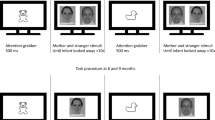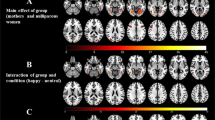Abstract
Numerous studies have shown that infant facial cues significantly influence adults’ caregiving perceptions and behavior. Infant facial cues may be an adaptive mechanism for infants, as they may provide important information about the infant to a potential caregiver and evoke caregiving behavior. However, there is less research on whether all adults perceive and respond to infant cues similarly. Adults’ individual differences, by way of their personality traits, may give rise to different motivations, perceptions, and behaviors related to caregiving, and therefore may play an important role in how adults perceive and respond to infant cues. To investigate this, we recruited 142 adults from the community. We used direct and indirect paths to examine the associations between adults’ personality traits (using the HEXACO Personality Inventory), perceptions of infant facial cues (using 54 infant face stimuli and the Infant Facial Cue Rating Scale), and caregiving motivations (using the Hypothetical Adoption Paradigm). The results showed that higher Emotionality and Conscientiousness were directly related to higher hypothetical adoption preference. Honesty-Humility was indirectly associated with higher adoption preference through higher ratings of baby cues. These results suggest that adults’ personalities are related to their perceptions of infants and caregiving desires. The findings from this study can also lead to offering extra support to adults who work/interact with infants and children across various contexts (e.g., schools, daycares, healthcare facilities, playgrounds, hospitals) and whose personality traits may be related to less positive perceptions of infants and caregiving desires.

Similar content being viewed by others
Data Availability
The dataset will not be available as participants in this study, as per [Insert university name] Research Ethics Board, were told that their responses would not be publicly available.
References
Alvergne, A., Faurie, C., & Raymond, M. (2007). Differential facial resemblance of young children to their parents: who do children look like more? Evolution and Human Behavior, 28, 135–144. https://doi.org/10.1016/j.evolhumbehav.2006.08.00.
Aradhye, C., Vonk, J., & Arida, D. (2015). Adults’ responsiveness to children’s facial expressions. Journal of Experimental Child Psychology, 135, 56–71. https://doi.org/10.1016/j.jecp.2015.02.006.
Arteche, A. X., Vivian, F. A., Dalpiaz, B. P. Y., & Salvador-Silva, R. (2016). Effects of sex and parental status on the assessment of infant faces. Psychology & Neuroscience, 9, 176–187. https://doi.org/10.1037/h0101552.
Ashton, M. C., & Lee, K. (2007). Empirical, theoretical, and practical advantages of the HEXACO model of personality structure. Personality and Social Psychology Review, 11(2), 150–166. https://doi.org/10.1177/1088868306294907.
Ashton, M. C., & Lee, K. (2009). The HEXACO–60: a short measure of the major dimensions of personality. Journal of personality assessment, 91, 340–345. https://doi.org/10.1080/00223890902935878.
Ashton, M. C., Lee, K., & De Vries, R. E. (2014). The HEXACO honesty-humility, agreeableness, and emotionality factors: A review of research and theory. Personality and Social Psychology Review, 18(2), 139–152.
Atzil, S., Hendler, T., Zagoory-Sharon, O., Winetraub, Y., & Feldman, R. (2012). Synchrony and specificity in the maternal and the paternal brain: relations to oxytocin and vasopressin. Journal of the American Academy of Child & Adolescent Psychiatry, 51, 798–811. https://doi.org/10.1016/j.jaac.2012.06.008.
Badr, L. K., & Abdallah, B. (2001). Physical attractiveness of premature infants affects outcome at discharge from the NICU. Infant Behavior and Development, 24, 129–133. https://doi.org/10.1016/S0163-6383(01)00068-6.
Baeken, C., De Raedt, R., Ramsey, N., Van Schuerbeek, P., Hermes, D., Bossuyt, A., et al. (2009). Amygdala responses to positively and negatively valenced baby faces in healthy female volunteers: influences of individual differences in harm avoidance. Brain research, 1296, 94–103. https://doi.org/10.1016/j.brainres.2009.08.010.
Belsky, J. (1984). The determinants of parenting: A process model. Child Development, 83–96.
Belsky, J., Crnic, K., & Woodworth, S. (1995). Personality and parenting: exploring the mediating role of transient mood and daily hassles. Journal of personality, 63, 905–929. https://doi.org/10.1111/j.1467-6494.1995.tb00320.x.
Bowlby, J. (1969). Attachment and loss v. 3 (Vol. 1). Random House. Furman, W., & Buhrmester, D. (2009). Methods and measures: the network of relationships inventory: Behavioral systems version International Journal of Behavioral Development, 33, 470–478. https://doi.org/10.1177/0165025409342634
Bressan, P., Bertamini, M., Nalli, A., & Zanutto, A. (2009). Men do not have a stronger preference than women for self-resemblant child faces. Archives of Sexual Behavior, 38, 657–664. https://doi.org/10.1007/s10508-008-9350-0.
Buss, D. M., & Greiling, H. (1999). Adaptive individual differences. Journal of Personality, 67, 209–243. https://doi.org/10.1111/1467-6494.00053.
Casey, R. J., & Ritter, J. M. (1996). How infant appearance informs: child care providers’ responses to babies varying in appearance of age and attractiveness. Journal of Applied Developmental Psychology, 17, 495–518. https://doi.org/10.1016/S0193-3973(96)90013-1.
Chasiotis, A., Hofer, J., & Campos, D. (2006). When does liking children lead to parenthood? Younger siblings, implicit prosocial power motivation, and explicit love for children predict parenthood across cultures. Journal of Cultural and Evolutionary Psychology, 4, 95–123. https://doi.org/10.1556/JCEP.4.2006.2.2.
Corter, C., Trehub, S., Boukydis, C., Ford, L., Celhoffer, L., & Minde, K. (1978). Nurses’ judgments of the attractiveness of premature infants. Infant Behavior and Development, 1, 373–380.
Cunningham, H. (2005). Children and childhood in western society since 1500. Pearson Education.
Daly, M., & Wilson, M. (1998). The truth about Cinderella: a Darwinian view of parental love. New Haven, CT: Yale University Press.
Dawkins, R. (1989). The selfish gene (second ed.). Toronto: Oxford University Press.
DeBruine, L. M. (2004). Resemblance to self increases the appeal of child faces to both men and women. Evolution and Human Behavior, 25, 142–154. https://doi.org/10.1016/j.evolhumbehav.2004.03.003.
DeBruine, L. M., Hahn, A. C., & Jones, B. C. (2016). Perceiving infant faces. Current Opinion, Perceiving infant faces in Psychology, 7, 87–91. https://doi.org/10.1016/j.copsyc.2015.08.010.
Eibl-Eibesfeldt, I. (1989). Human ethology. New York, NY: Aldine de Gruyter.
Franklin, P., & Volk, A. A. (2018). A review of infants’ and children’s facial cues’ influence on adults’ perceptions and behaviors. Evolutionary Behavioral Sciences., 12, 296–321. https://doi.org/10.1037/ebs0000108.
Glocker, M. L., Langleben, D. D., Ruparel, K., Loughead, J. W., Gur, R. C., & Sachser, N. (2009a). Baby schema in infant faces induces cuteness perception and motivation for caretaking in adults. Ethology, 115, 257–263. https://doi.org/10.1111/j.1439-0310.2008.01603.x.
Glocker, M. L., Langleben, D. D., Ruparel, K., Loughead, J. W., Valdez, J. N., Griffin, M. D., et al. (2009b). Baby schema modulates the brain reward system in nulliparous women. Proceedings of the National Academy of Sciences of the United States of America, 106, 9115–9119. https://doi.org/10.1073/pnas.0811620106.
Golle, J., Probst, F., Mast, F. W., & Lobmaier, J. S. (2015). Preference for cute infants does not depend on their ethnicity or species: evidence from hypothetical adoption and donation paradigms. PLoS ON,E, 10, e0121554. https://doi.org/10.1371/journal.pone.0121554.
Hahn, A. C., & Perrett, D. I. (2014). Neural and behavioral responses to attractiveness in adult and infant faces. Neuroscience and Biobehavioral Reviews, 46, 591–603. https://doi.org/10.1016/j.neubiorev.2014.08.015.
Hahn, A. C., Symons, L. A., Kredel, T., Hanson, K., Hodgson, L., Schiavone, L., & Jantzen, K. J. (2016). Early and late event-related potentials are modulated by infant and adult faces of high and low attractiveness. Social neuroscience, 11, 207–220. https://doi.org/10.1080/17470919.2015.1059361.
Hamilton, W. D. (1963). The evolution of altruistic behavior. The American Naturalist, 97, 354–356.
Hamilton, W. J., & Orians, G. H. (1965). Evolution of brood parasitism in altricial birds. The Condor, 67, 361–382. https://doi.org/10.2307/1365631.
Hawkes, K., O’Connell, J. F., Jones, N. G. B., Alvarez, H., & Charnov, E. L. (2017). The grandmother hypothesis and human evolution. In Adaptation and human behavior (pp. 237-258). Routledge.
Hilbig, B. E., & Zettler, I. (2009). Pillars of cooperation: Honesty–Humility, social value orientations, and economic behavior. Journal of Research in Personality, 43, 516–519. https://doi.org/10.1016/j.jrp.2009.01.003.
Hildebrandt, K. A., & Fitzgerald, H. E. (1978). Adults’ responses to infants varying in perceived cuteness. Behavioural Processes, 3, 159–172. https://doi.org/10.1016/0376-6357(78)90042-6.
Hodson, G., Book, A., Visser, B. A., Volk, A. A., Ashton, M. C., & Lee, K. (2018). Is the dark triad common factor distinct from low Honesty-Humility? Journal of Research in Personality, 73, 123–129. https://doi.org/10.1016/j.jrp.2017.11.012.
Hrdy, S. B. (1999). Mother nature: natural selection and the female of the species. Chatto & Windus.
Hrdy, S. B. (2007). Evolutionary context of human development: The cooperative breeding model. Family Relationships: An Evolutionary Perspective, 39–68.
Hrdy, S. B. (2011). Mothers and others. Harvard University Press.
Jia, Y., & Zhang, D. (2016). Research advancement of infant’s face preference. Advances in Psychology, 6, 958–965. https://doi.org/10.12677/AP.2016.69123.
Kim, P., Capistrano, C. G., Erhart, A., Gray-Schiff, R., & Xu, N. (2017). Socioeconomic disadvantage, neural responses to infant emotions, and emotional availability among first-time new mothers. Behavioural Brain Research, 325, 188–196. https://doi.org/10.1016/j.bbr.2017.02.001.
Konner, M. (2010). The evolution of childhood: relationships, emotion, mind. Cambridge, MA: Harvard University Press.
Kringelbach, M. L., Stark, E. A., Alexander, C., Bornstein, M. H., & Stein, A. (2016). On cuteness: unlocking the parental brain and beyond. Trends in Cognitive Sciences, 20, 545–558. https://doi.org/10.1016/j.tics.2016.05.003.
Langlois, J. H., Ritter, J. M., Casey, R. J., & Sawin, D. B. (1995). Infant attractiveness predicts maternal behaviors and attitudes. Developmental Psychology, 31, 464–472. https://doi.org/10.1037/0012-1649.31.3.464.
Lee, K., & Ashton, M. C. (2004). Psychometric properties of the HEXACO personality inventory. Multivariate Behavioral Research, 39(2), 329–358.
Lee, K., & Ashton, M. C. (2006). Further assessment of the HEXACO Personality Inventory: two new facet scales and an observer report form. Psychological assessment, 18(2), 182–191. https://doi.org/10.1037/1040-3590.18.2.182.
Lee, K., & Ashton, M. C. (2013). The H factor of personality: why some people are manipulative, self-entitled, materialistic, and exploitive—and why it matters for everyone. Press: Wilfrid Laurier Univ.
Lehmann, V., Huisi n’t Veld, E. M., & Vingerhoets, A. J. (2013). The human and animal baby schema effect: correlates of individual differences. Behavioural Processes, 94, 99–108. https://doi.org/10.1016/j.beproc.2013.01.001.
Lobmaier, J. S., Sprengelmeyer, R., Wiffen, B., & Perrett, D. I. (2010). Female and male responses to cuteness, age and emotion in infant faces. Evolution and Human Behavior, 31, 16–21. https://doi.org/10.1016/j.evolhumbehav.2009.05.004.
Lorenz, K. (1943). Die angeborenen Formern moglicher Erfahrung. Zeitschrift fur Tierpsychologie, 5, 235–409. https://doi.org/10.1111/j.1439-0310.1943.tb00655.x.
Lucion, M. K., Oliveira, V., Bizarro, L., Bischoff, A. R., Silveira, P. P., & Kauer-Sant’Anna, M. (2017). Attentional bias toward infant faces - review of the adaptive and clinical relevance. International Journal of Psychophysiology, 114, 1–8. https://doi.org/10.1016/j.ijpsycho.2017.01.008.
Luo, L. Z., Li, H., & Lee, K. (2011). Are children’s faces really more appealing than those of adults? Testing the baby schema hypothesis beyond infancy. Journal of Experimental Child Psychology, 110, 115–124. https://doi.org/10.1016/j.jecp.2011.04.002.
Luo, L., Ma, X., Zheng, X., Zhao, W., Xu, L., Becker, B., & Kendrick, K. M. (2015). Neural systems and hormones mediating attraction to infant and child faces. Frontiers in Psychology, 6, 970. https://doi.org/10.3389/fpsyg.2015.00970.
Manson, J. H. (2015). Life history strategy and the HEXACO personality dimensions. Evolutionary Psychology, 13, 48–66. https://doi.org/10.1177/147470491501300104.
Mariana, C., Fabiana, M., & Andreea, N. E. (2016). The personality of kindergarden teachers. Romanian Journal of Experimental Applied Psychology, 7, 71–84. https://doi.org/10.15303/rjeap.2016.v7i1.a6.
Muthén, B. O., Muthén, L. K., & Asparouhov, T. (2017). Regression and mediation analysis using Mplus. Los Angeles, CA: Muthén & Muthén.
Platek, S. M., Raines, D. M., Gallup Jr., G. G., Mohamed, F. B., Thomson, J. W., Myers, T. E., Panyavin, I. S., Levin, S. L., Davis, J. A., Fonteyn, L. C. M., & Arigo, D. R. (2004). Reactions to children’s faces: males are more affected by resemblance than females are, and so are their brains. Evolution and Human behavior, 25, 394–405. https://doi.org/10.1016/j.evolhumbehav.2004.08.007.
Prinzie, P., Stams, G. J. J., Deković, M., Reijntjes, A. H., & Belsky, J. (2009). The relations between parents’ Big Five personality factors and parenting: a meta-analytic review. Journal of Personality and Social Psychology, 97, 351–362. https://doi.org/10.1037/a0015823.
Rawson, B. (2003). Children and childhood in Roman Italy. OUP Oxford.
Ritts, V., Patterson, M. L., & Tubbs, M. E. (1992). Expectations, impressions, and judgments of physically attractive students: a review. Review of educational research, 62, 413–426.
Ruiz Ortiz, R. M., & Barnes, J. (2019). Temperament, parental personality and parenting stress in relation to socio-emotional development at 51 months. Early Child Development and Care, 189, 1978–1991. https://doi.org/10.1080/03004430.2018.1425297.
Scheper-Hughes, N. (1985). Culture, scarcity, and maternal thinking: maternal detachment and infant survival in a Brazilian shantytown. Ethos, 13, 291–317. https://doi.org/10.3102/00346543062004413.
Schiralli, K., Brazil, K., Franklin, P., Spadafora, N., & Al-Jbouri, E. (2019). Evolutionary personality psychology. In T. K. Shackelford & V. A. Weekes-Shakelford (Eds.), Encyclopedia of Evolutionary Psychological Science (pp. 1–13). Springer: New York. https://doi.org/10.1007/978-3-319-16999-6_672-1.
Singer, T. (2006). The neuronal basis and ontogeny of empathy and mind reading: review of literature and implications for future research. Neurosci. Biobehav. Rev., 30, 855–863. https://doi.org/10.1016/j.neubiorev.2006.06.011.
Sprengelmeyer, R., Perrett, D. I., Fagan, E. C., Cornwell, R. E., Lobmaier, J. S., Sprengelmeyer, A., Aasheim, H. B. M., Black, I. M., Cameron, L. M., Crow, S., Milne, N., Rhodes, E. C., & Young, A. W. (2009). The cutest little baby face: a hormonal link to sensitivity to cuteness in infant faces. Psychological Science, 20, 149–154. https://doi.org/10.1111/j.1467-9280.2009.02272.x.
Tabachnick, B. G., & Fidell, L. S. (2007). Using multivariate statistics, 5th. Needham Height, MA: Allyn & Bacon.
Volk, A., & Quinsey, V. L. (2002). The influence of infant facial cues on adoption preferences. Human Nature, 13, 437–455. https://doi.org/10.1045/6767/01/$1.00+.10.
Volk, A. A., & Quinsey, V. L. (2007). Parental investment and resemblance: replications, refinements, and revisions. Evolutionary Psychology, 5, 1–14. https://doi.org/10.1177/147470490700500101.
Volk, A. A., Lukjanczuk, J. M., & Quinsey, V. L. (2005). Influence of child and infant facial cues of low body weight on adults ratings of adoption preference, cuteness, and health. Infant Mental Health Journal, 26, 459–469. https://doi.org/10.1002/imhj.20064.
Vorkapić, S. T., Čepić, R., & Šekulja, I. (2016). Are there any differences in personality traits and life satisfaction between future preschool and primary school teachers? Journal of Research in Childhood education, 30(3), 361–373. https://doi.org/10.1080/02568543.2016.1179236.
Watt, D. F. (2005). Social bonds and the nature of empathy. Journal of Consciousness Studies, 12(8–9), 185–209.
Welling, L. L., Burriss, R. P., & Puts, D. A. (2011). Mate retention behavior modulates men’s preferences for self-resemblance in infant faces. Evolution and Human Behavior, 32, 118–126. https://doi.org/10.1016/j.evolhumbehav.2010.11.001.
Westneat, D. F., & Sherman, P. W. (1993). Parentage and the evolution of parental behavior. Behavioral Ecology, 4, 66–77. https://doi.org/10.1093/beheco/4.1.66.
Wu, H., Yang, S., Sun, S., Liu, C., & Luo, Y. J. (2013). The male advantage in child facial resemblance detection: behavioral and ERP evidence. Social Neuroscience, 8, 555–567. https://doi.org/10.1080/17470919.2013.835279.
Xia, X. (1992). Uncertainty of paternity can select against paternal care. The American Naturalist, 139, 1126–1129.
Acknowledgments
I would like to thank Dr. Anthony A. Volk for his edits on earlier verions of this manuscript, as well as his support and assistance in completing this research.
Code Availability
The syntax for the path analysis conducted is available in the supplementary file labeled “Syntax”.
Author information
Authors and Affiliations
Corresponding author
Ethics declarations
Conflict of Interest
The author declares that there is no conflict of interest.
Additional information
Publisher’s Note
Springer Nature remains neutral with regard to jurisdictional claims in published maps and institutional affiliations.
Rights and permissions
About this article
Cite this article
Franklin-Luther, P. How Do Adults’ Personality Traits Influence Perceptions and Responses to Infant Faces?. Evolutionary Psychological Science 6, 389–398 (2020). https://doi.org/10.1007/s40806-020-00248-8
Received:
Revised:
Accepted:
Published:
Issue Date:
DOI: https://doi.org/10.1007/s40806-020-00248-8




